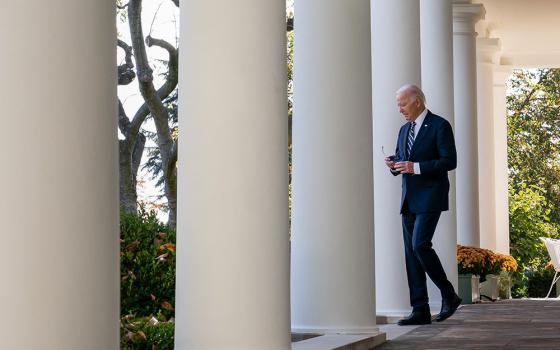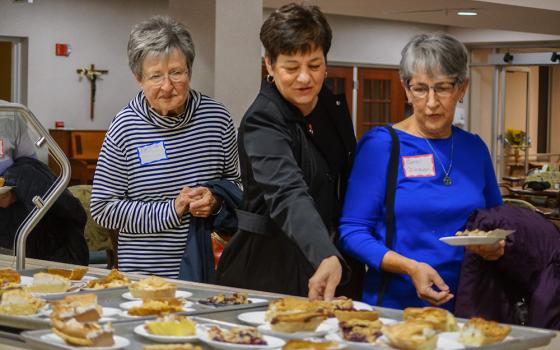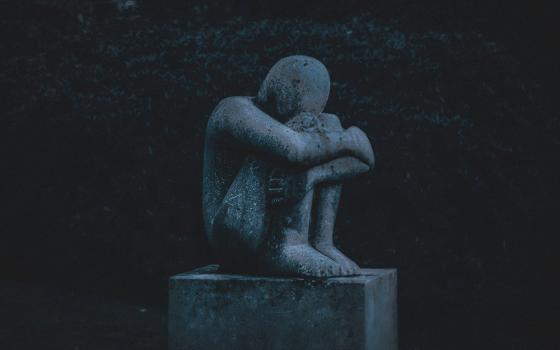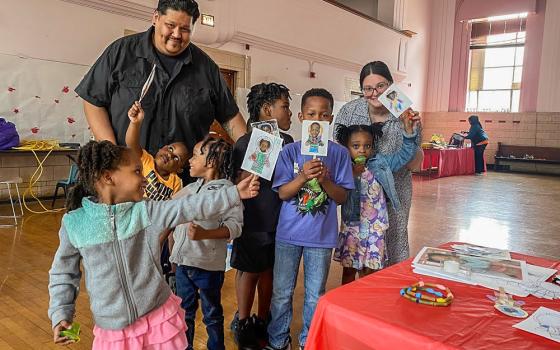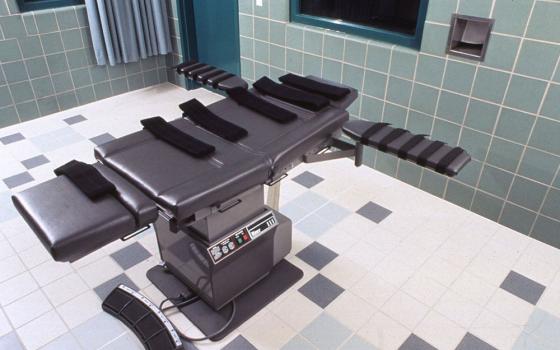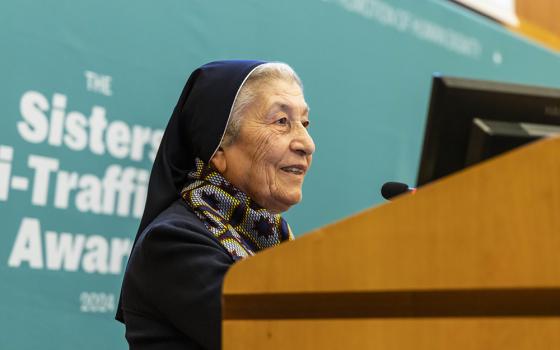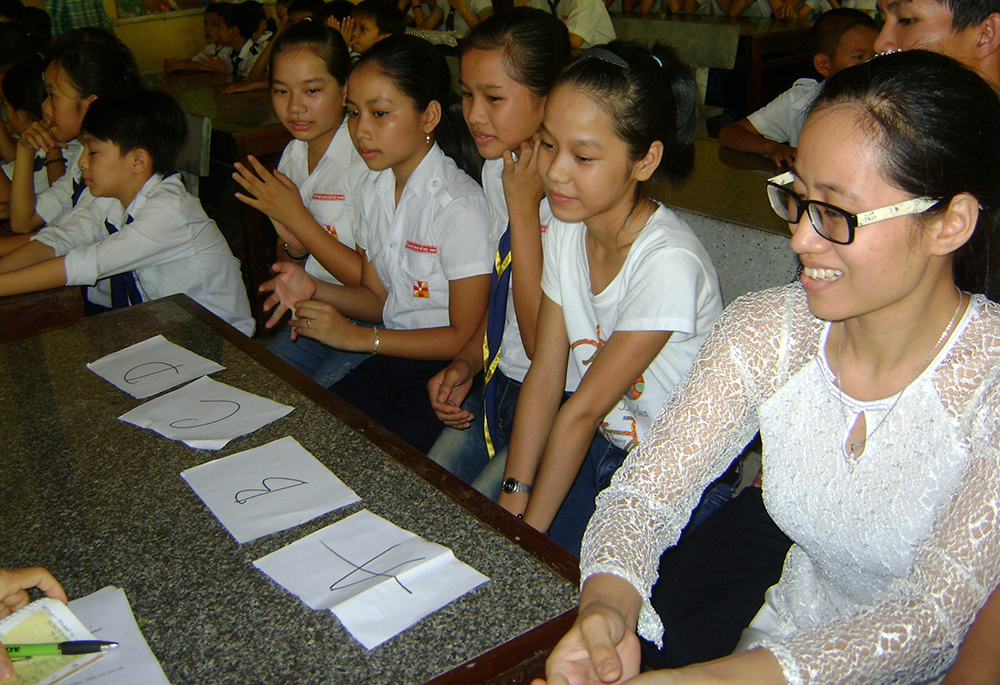
Apostolate Auxiliaries Sr. Mary Ton Nu Thu Tra (right) teaches catechism to children at Quang Ngan Parish, July 2 in Vietnam's Thua Thien Hue province. (GSR photo/Joachim Pham)
In a country where Catholic sisters nearly always wear religious habits, Sr. Mary Ton Nu Thu Tra dresses in regular street clothes like most women and lives with her family.
"Only a few people recognize my religious identity, so I have opportunities to carry out my mission — that is, to bear witness to the Gospel values in my daily life by living a humble and gentle life and bringing joy and peace to other people, especially my students," she said.
Tra, a member of the Secular Institute of Apostolate Auxiliaries (which has no communal facilities and does not require wearing habits), said she joined the institute because "I am interested in following religious life quietly and getting close to people I work with to come to their aid."
In the Hue Archdiocese, secular institutes draw many women from all walks of life, and because of the flexibility that comes with this lifestyle, they feel they can both closely follow religious life and discreetly serve others in a more intimate capacity, many told GSR.
Secular institutes are groups of people following consecrated lives, and, according to the Catechism of the Catholic Church, their goals are to aim for perfect charity and strive to contribute to the world's sanctification while living "within" the world. The word "secular" is meant to underscore the fact that those in this life continue to live and work in the normal conditions of their own social setting, according to canon law.
Their members — including laypeople and clergy — live a consecrated life by following the three vows (chastity, poverty, obedience) in their regular lives, and they are under local bishops' care. Candidates must be at least 18, remain single, and not be members of any other type of institute for religious life.
Tra, a high school English teacher, said she has saved 11 students who attempted or threatened suicide for suffering bullying and violence in school. Her ability to intervene, she said, is thanks to the fact that she looks like an ordinary person, making it easier for the students to open up and confide in her, in some cases texting her before they attempt the fatal act.
Thuy Trang, an 11th grader who used to suffer bullying, said Tra is "one of our trusted teachers and we treat her like our mothers."
Tra, who joined the secular institute in 2000, said the institute members are called to live in harmony with all people — regardless of their backgrounds in society — to bring the Gospel to them and help relieve their pain and suffering.
"We work in state-run schools and hospitals, factories, hotels and other places where few nuns from other congregations can join," she said, adding that they do not live the community life, and instead live with their families and work to support themselves.
The secular institute was established in 1970 by the late Archbishop Philippe Nguyen Kim Dien of Hue, who tried to promote the revolutionary spirit of the Second Vatican Council in the former South Vietnam, where many people experienced the horrors of the U.S.-backed war against northern communist forces.
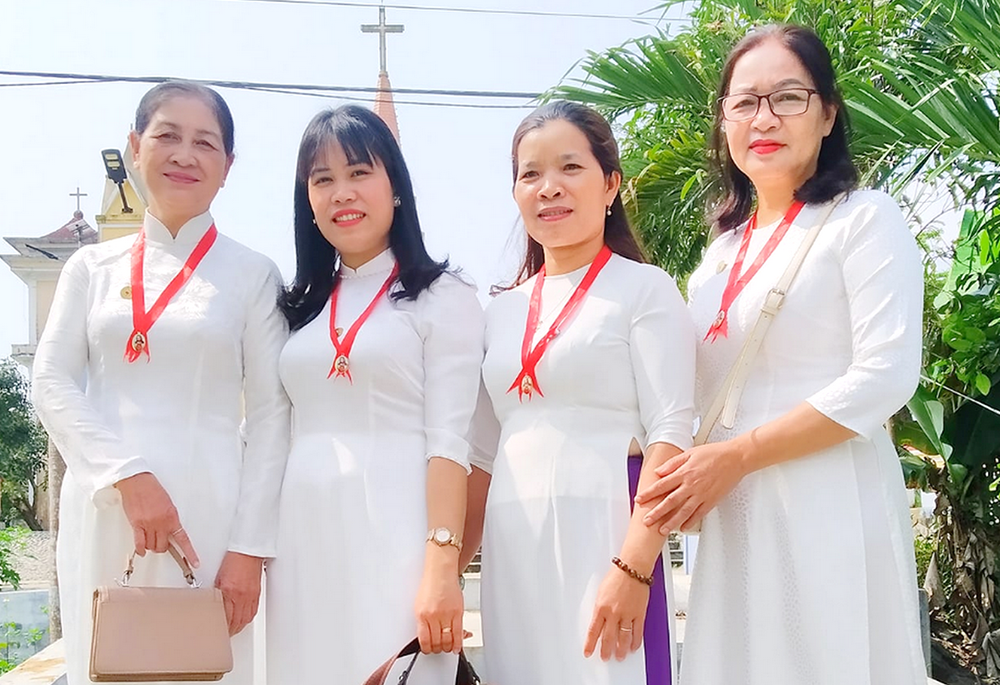
Servants of the Gospel members (from left) Anna Nguyen Thi My, Mary Vo Thi Minh Khue, Mary Ngo Thi Thuy, and Lucia Le Thi Phuong Thuy are pictured in traditional dress at their monthly retreat at Phu Thanh Parish, Sept. 15 in Hue. (GSR photo/Joachim Pham)
The archbishop encouraged local Catholics to work with atheists and people of other faiths to look after injured people, come to the aid of evacuee families and natural disaster victims, protest the war, and fight against government corruption.
The institute based in Hue, capital of the central province of Thua Thien Hue, has 62 members ages 18-75 and attracts new members at similar rates of other religious congregations in Vietnam.
Candidates are required to attend 10-day retreats at local cloisters to discern their vocations before joining the institute. They also take the three vows and attend meetings, retreats, as well as courses in Scripture, catechism, and theology on a regular basis.
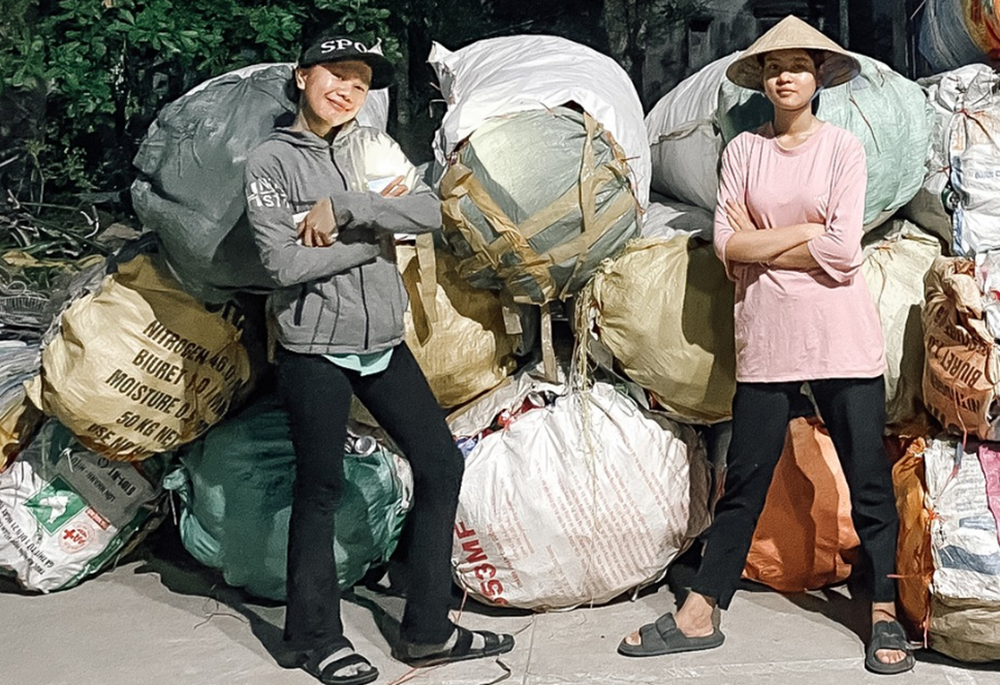
Servants of the Gospel Sr. Anna Le Thi Phap (left) and a lay volunteer from Phu Xuan parish's Catholic Youths Association collect and sell paper, metal, and plastic scrap from local households three days a week, with proceeds going to people in need. (GSR photo/Joachim Pham)
Servants of the Gospel Sr. Anna Le Thi Phap said she wished to be a St. Paul de Chartres nun since she was a teenager, but her mother encouraged her to stay home to work on farms to support the family. She has four siblings, three of whom are religious.
After her mother died, Phap dropped out of the 12th grade to look after her ailing father.
She entered the secular institute at 30 years old, when her parish priest introduced her to the institute.
"I am in seventh heaven with the institute because I am allowed to live with my family and grow crops for a living," said the 39-year-old, who was too old to join other congregations. She lives out her vocation, she said, by maintaining the houses and farms of those in hospitals, as well as making donations and caring for them.
Fr. Anthony Nguyen Van Tuyen, who served as a spiritual director of the Secular Institute of Servants of the Gospel for five years, said local secular institutes provide an opportunity for older women to follow religious vocations and bear witness of the Gospel in the world.
There are clear differences between secular institutes and other religious orders.
The priest, an expert in canon law, said in Vietnam, sisters from religious orders are required to live together in convents and be dressed in habits. To become nuns, candidates aged 18-25 have to spend a training period of 10-14 years before publicly taking lifelong vows of chastity, poverty and obedience.
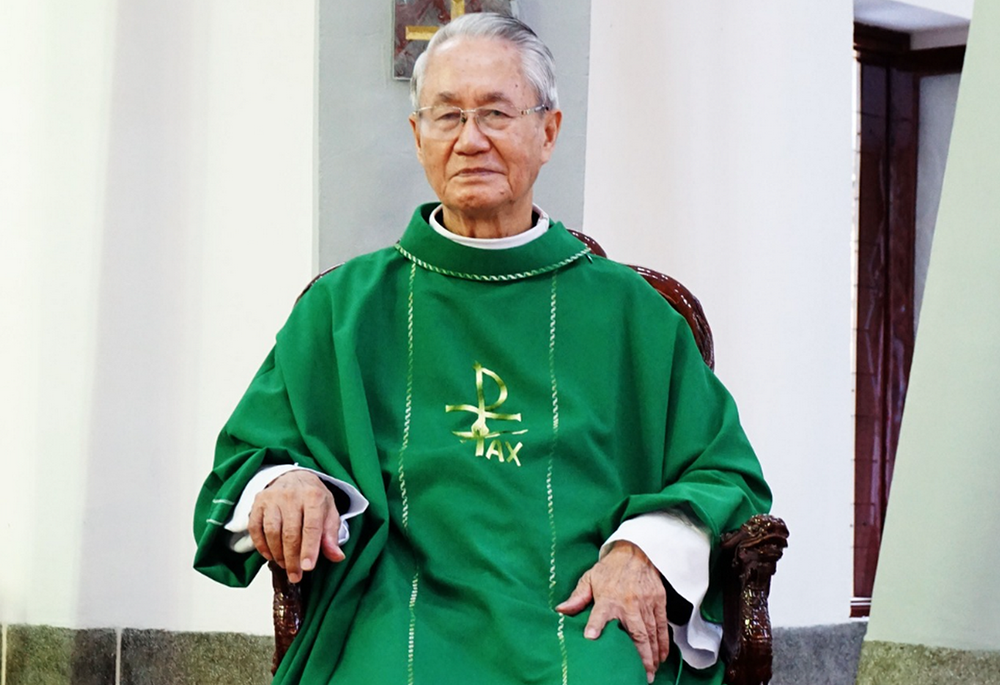
Fr. Anthony Nguyen Van Tuyen celebrates Mass at the house of Hue Archbishop Joseph Nguyen Chi Linh. (GSR photo/Joachim Pham)
They have no private property but own the convents' properties communally, and they must obtain consent from their superiors to cover their personal and pastoral needs.
Nuns from secular institutes — also a consecrated life — "lead their lives in the ordinary conditions of the world according to the norm of the constitutions, whether alone, or in their own families, or in a group living as brothers or sisters," according to Canon 714. They show their consecration by doing apostolic and charitable work among people around them, Tuyen said.
They have no habits and either live alone, with their own families, or in groups, and are allowed personal possessions.
The 76-year-old priest said before joining the secular institutes, candidates ages 18 and above spend one to three weeks learning liturgy, the Bible and the institutes' constitutions, attending retreats, and taking their religious vows in front of spiritual directors. They are not required to make their vows publicly.
Apostolate Auxiliaries Sr. Agnes Le Thi San, 58, said her institute attracts few people, as its members without religious habits are not held in great respect like other nuns, and have to seek care from their relatives — rather than their community — when they get sick and grow old.
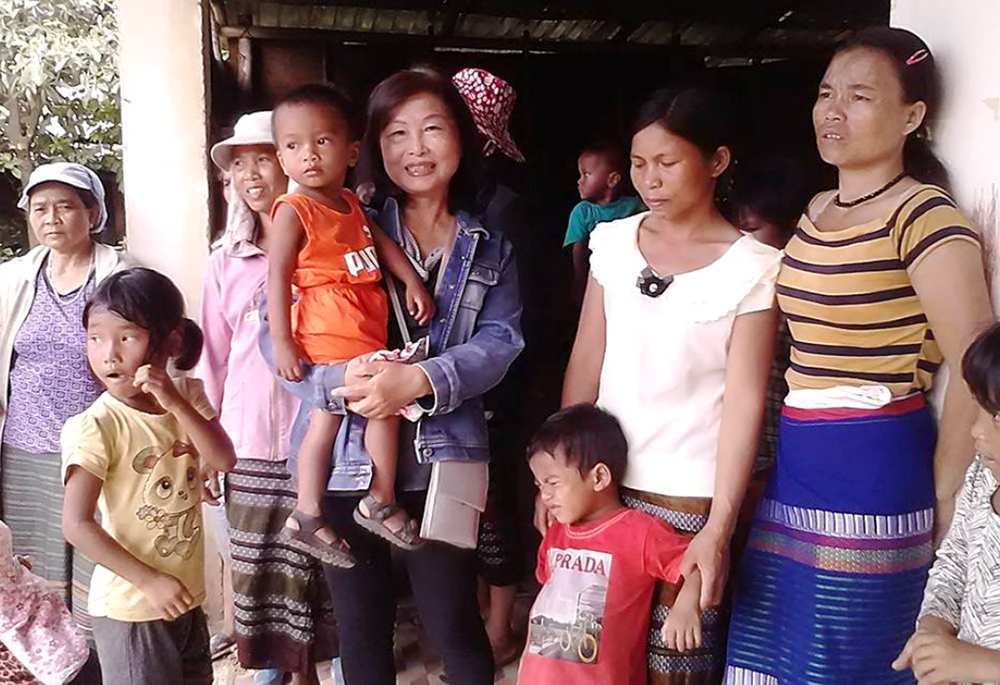
Apostolate Auxiliaries Sr. Agnes Le Thi San (center) visits women who have been given material and spiritual support to avoid abortions in A Luoi District of Thua Thien Hue province, June 10. (GSR photo/Joachim Pham)
San, a retired teacher who entered the secular institute in 2014, said after work, institute members take part in a number of ministries, including caring for people with HIV/AIDS; working with pregnant women who considered abortions after their boyfriends abandoned them; working at church-run orphanages; leading evangelization work and faith education; and coming to the aid of people in need.
"I spend all my time looking after babies abandoned by their mothers and working with discarded pregnant women who refused to have abortions," she said. "I live my life to the fullest as I bring divine love to those people in misery."
Hue Archdiocese has, in addition to the Apostolate Auxiliaries (the oldest secular institute), two other secular institutes: Servants of the Gospel and Missionaries of the Sacred Heart of Jesus, established in 2012 and 2016 respectively. Both institutes have a total of 35 female members.
Sr. Agatha Ngo Thi Kim Mai said she decided to enter the Servants of the Gospel at the age of 27 after an institute member who works as a nurse tended to her wounds from a motorbike accident. Later, she was invited to attend the institute's retreats, prayers, and pilgrimages to the national Shrine of Our Lady of La Vang.

Servants of the Gospel Sr. Agatha Ngo Thi Kim Mai works as a security guard for a private hotel in Hue. (GSR photo/Joachim Pham)
Mai, 34, said she was deeply impressed with institute members' kindness and sisterhood, and she worked with other members to pay home visits to patients and people in need.
The nun, who works as a security guard for a private hotel in Hue for a living, said she tries to carry out the institute's mission of helping people feel divine love and improve their spiritual and material life.
"I recite prayers before meals, go to church early mornings, offer birthday presents to my staff members, attend their dead relatives' funerals, and come to the help of hotel guests," she said. "Consequently, many people have good relationships with me."
The nun also spends time making home visits to elderly people and patients and calls for benefactors to provide wheelchairs for them.
"Our religious vocations and jobs are a main source of happiness to us," Mai said. "I am absolutely delighted to be in the institute that is my second family."
